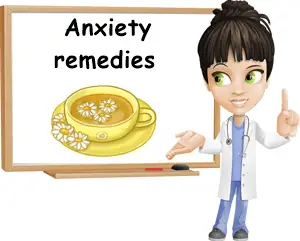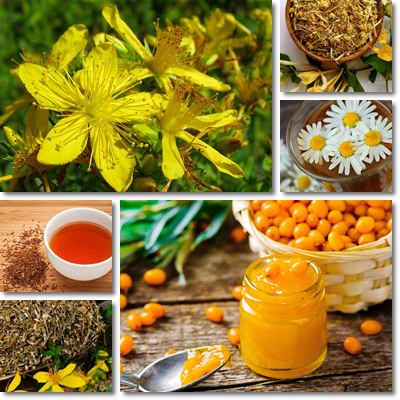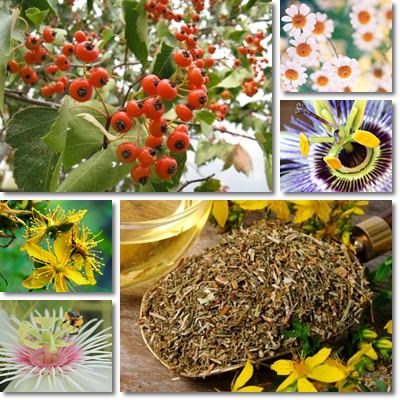Anxiety is a mental illness of high incidence among adults of all ages and, in recent years, also teenagers. It’s indiscriminate, consuming and extremely challenging to address. Recovery is not always straightforward and often involves a multifaceted approach that accommodates pharmaceuticals, therapy, dietary and lifestyle changes, vitamin and mineral supplementation to correct nutritional deficiencies and use of anti-anxiety medicinal herbs to manage both mental and physical symptoms.
The best anti-anxiety herbal remedies are those with a sedative action on the nervous system, the starting point of all symptoms. This includes herbs with a particularly strong action on the nervous, but also circulatory system, such as St John’s wort, common hawthorn or valerian. Depending on the causes and type of anxiety and whether or not the person is receiving medication, anti-anxiety herbal remedies may be more or less efficient in keeping symptoms under control. Overall, anxiety is known to be particularly responsive to the use of herbal remedies.

The following 9 medicinal herbs have been reported to be surprisingly efficient anti-anxiety remedies and contribute to improving both mental and physical symptoms and reduce the severity of several forms of the disorder.
St John’s wort for anxiety
Research on the properties and benefits of St John’s wort (Hypericum perforatum) shows the herb is particularly efficient in treating insomnia, nervousness, mood changes, seasonal affective disorder, anxiety disorders and depression. Extracts of the plant as well as herbal infusions are commonly recommended. St John’s wort has a direct action on the nervous system and research suggests its beneficial effects are a result of components such as hypericin, hyperforin, adhyperforin etc. that inhibit certain chemical reactions in the brain.
It has been theorized that components in St John’s wort slow down the rate at which certain neurotransmitter such as serotonin are reabsorbed (a mechanism called re-uptake inhibition).
This leads to a higher concentration of neurotransmitters such as serotonin in nerve cell synapses, resulting in alterations of brain chemistry that lead to improved mood and recommend St John’s wort for treating anxiety and depression.
However, the same mechanism of action that helps improve mood causes an increase in other neurotransmitters such as dopamine, which would explain the possibility of St John’s wort causing psychotic events in schizophrenia sufferers. St John’s wort is usually well tolerated by most people, and is safe for use when taken under the supervision and at the advice of a medical professional.
However, the herb is known to interact with antidepressants and other medication such as blood thinning medication, contraceptives, certain analgesics, HIV and chemotherapy medication, either increasing or decreasing their effectiveness. It is also not recommended for pregnant women and nursing mothers. If you plan on taking St John’s wort for your anxiety, it is important to talk to your doctor about whether or not it can interact with medicines you might be currently on and find out the ideal dosage for you.

Valerian for anxiety
The herb valerian (Valeriana officinalis) can help treat insomnia and improve sleep quality, reduce stress and induce relaxation, proving useful for anxiety management. Anxiety often occurs in anticipation of a stressful event or situation (example: public speaking). The stress of such an event often builds up and can cause excessive worry, inability to enjoy a restful sleep, insomnia and other psychological and physical symptoms. Valerian acts as a mild sedative, inducing calm and reducing stress levels, which also allows for restful sleep. Unfortunately, it doesn’t have a very pleasant odor.
The part of the plant most commonly used for this purpose is the root and it can come in liquid or tablet form, while herbal infusions generally boast milder effects. Root extract doses are best established by a trained professional and are quite effective on their own. When it comes to herbal infusions, combining valerian with other calm-inducing herbs such as chamomile or lemon balm can add to its potency.
However, it is not advised to combine valerian with kava, another herb known for its anxiolytic properties. Constituents in valerian may interact with constituents in kava (kavalactones such as kavain, desmethoxyyangoning or dyhydrokavain) and negatively impact mental health. Moreover, kava contains toxic active constituents as well, making it potentially unsafe for use.
The way valerian acts is by inducing a state of calm and its effects are soothing, mildly sedative rather than tranquilizing, which is why it may appear it is not working as it should. Moreover, some people report improvements in sleep quality and lower anxiety levels only after having taken valerian for several weeks up to a month.
California poppy (golden poppy) for anxiety
California poppy (Eschscholzia californica) is an excellent anti-anxiety herb that promotes restful sleep and helps reduce anxiety levels. The herb has a complex action and exhibits anxiolytic (anti-anxiety), analgesic, spasmolytic (antispasmodic) and sleep-inducing properties and can be used for a variety of disorders, from anxiety and sleep disturbances to digestive system problems, nerve problems and pain management. The roots, seeds and leaves can all be used and preparations of the herb are known to have a bitter taste.
However, it is important to address a doctor if you are planning on taking California poppy for anxiety, especially if you are already being treated with conventional medication or are having surgery (and require anesthesia), in order to avoid possible interactions. The herb is known to cause drowsiness and sleepiness. Moreover, pregnant women and nursing mothers are advised to avoid it because of the lack of proper research on its safety during pregnancy and following birth. Also, it is common for California poppy to be used in combination with passionflower, lemon balm, chamomile, lavender and St John’s wort for a more potent effect.
Passionflower for anxiety
Passiflora or passionflower is known for its anxiolytic, sedative and mildly analgesic properties. Preparations of passionflower leaves and fruit are commonly employed for the management and treatment of anxiety, insomnia, nervousness, hyperactivity, even palpitations, arrhythmia, hypertension, asthma, aches and pains, pathological or not. Herbal infusions are helpful for insomnia and anxiety feelings, while other stronger preparations (extracts) are reported to help with more severe anxiety and panic attacks.
While effects may vary depending on individual tolerance to the herb’s active constituents, passiflora is generally highly effective for anxiety. However, pregnant women should avoid passionflower because it may cause a miscarriage.
Rooibos for anxiety
Also known as red bush, rooibos (Aspalathus linearis) is a tea herb from South Africa. Rooibos is great for inducing relaxation, relieving stress and managing anxiety symptoms. Because of its calming effects, it encourages restful sleep and relieves tension and headaches. Herbal infusions have a mild taste and a hint of sweetness without actually being sweet. Rooibos does not contain caffeine and is low in tannins, hence its calming effects and pleasant flavor. Rooibos may also exert a mildly hypotensive effect. Because of its action on the central nervous system, the herb is great for dealing with irritability, nervousness, disturbed sleep, insomnia, anxiety, nervous stomach etc.

Hawthorn for anxiety
Unlike other anti-anxiety herbs, the anxiolytic effects of hawthorn are a result of its action on the cardiovascular system (see the benefits of hawthorn). Hawthorn extracts and herbal infusions boast excellent blood pressure lowering effects, the herb being a wonderful natural remedy for hypertension.
But high blood pressure and other cardiovascular manifestations such as palpitations, arrhythmia, extrasystoles, increased pulse, shallow breathing can all be symptoms of anxiety disorder. In turn, cardiovascular manifestations of anxiety can lead to psychological symptoms such as dizziness, lightheadedness, difficulty concentrating, irritability, nervousness, restlessness, sweating etc. By exerting a calming action on the cardiovascular system, hawthorn can help manage other psychological and physical symptoms of anxiety, contributing to managing the condition.
However, due to its potent effects (can induce a state of sedation) and for safety concerns, it is best not to exceed recommended doses. The leaves, flowers and berries of various hawthorn varieties may be used for medicinal purposes. There is also a honey made from the nectar of hawthorn flower and called hawthorn honey.
For me, hawthorn is an excellent choice. While my blood pressure is slightly lower than normal, drinking one cup of tea whenever I feel particularly stressed and sense my anxiety is overwhelming me, gives me a wonderful sense of calm and peace. I feel as if nothing can upset me, as if my worries are for another day and I can’t wait to crawl into bed and enjoy a good night’s rest. If I drink two or more cups of hawthorn tea one after another, my blood pressure drops too low and I don’t feel very good, partly because I am already hypotensive. But one cup is great for both my anxiety and my insomnia. See the benefits of hawthorn tea.
Lemon balm for anxiety
Lemon balm (Melissa officinalis) is a milder anti-anxiety herb of the mint family. Extracts, herbal infusions and various preparations are often recommended for inducing sleep and relieving stress and have a calming, rather than sedative effect. Research suggests that rosmarinic acid, a major biologically active constituent in lemon balm (also perilla and rosemary) exhibits anti-anxiety and antidepressant activity, hence the benefits of the herb in managing anxiety.
However, lemon balm has a mild action compared to other anti-anxiety herbs. Combining it with other anxiolytic plants such as valerian could increase its potency and benefits. Lemon balm is also very soothing on the digestive system and may help with acid reflux, indigestion and other stomach-related anxiety symptoms.
Find out more about the benefits of lemon balm.
Chamomile for anxiety
Chamomile (Matricaria chamomilla, Chamaemelum nobile) is known for its gentle action on the nervous, cardiovascular and digestive systems. It is used internally in the form of infusions or tinctures to induce sleep, treat insomnia, relieve stress and anxiety, calm digestive problems and reduce inflammation. It is also used in special preparations for various skin problems.
Because of its mild action, the anti-anxiety effects of chamomile may depend on individual tolerance to the herb. Also, being a member of the daisy family, chamomile can cause allergic reactions. Moreover, it is not safe for use during pregnancy and can interact with anticoagulants.
Lavender for anxiety
Unlike other anti-anxiety herbs, lavender is principally used externally in aromatherapy to reduce stress, induce calm and relieve muscle tension, aches, anxiety and insomnia. Preferred uses include lavender oil for massage or use in vaporizers. The essential oil also appears to be effective on mild burns and as a local analgesic.
Conclusion
There are numerous herbs with anti-anxiety potential in addition to passionflower, St John’s wort, valerian or California poppy, with effects ranging from mild to strong. Choosing the right one for us may take time because not everything that may work for others might work for us too, or in the same manner. The important thing to remember is to consult a medical professional to see if a certain anti-anxiety herb is good for us, whether or not it may interact with medication we might be taking and what the ideal dosage for us would be. Overall, these 9 surprising anti-anxiety herbs are a good starting point for anyone looking to treat their anxiety the herbal way.
